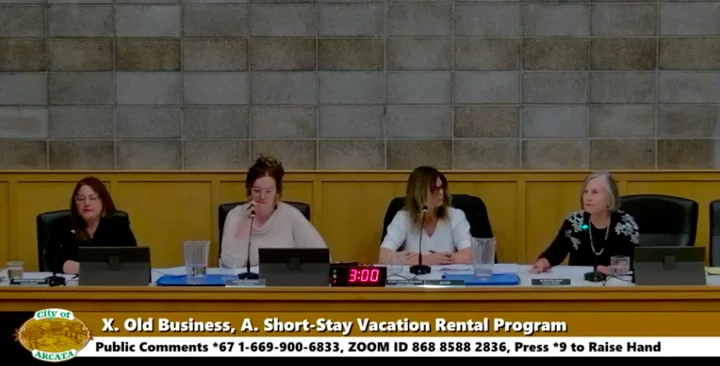Most of the Arcata City Council at City Hall (Councilmember Brett Watson attended virtually) | Screenshot from Wed. Oct 19 meeting video
###
PREVIOUSLY:
###
If you operate an AirBnB or VRBO rental in Arcata, or are thinking about opening one up, you should know that during Wednesday night’s Arcata City Council meeting the council requested a few changes to the city’s Short Stay Vacation Rental Ordinance.
Council adopted that ordinance last year, and it placed a few stricter regulations on how vacation rentals are permitted and operated and capping the number of vacation rental units permitted in the city at 100. Since passing the ordinance, the council has requested that staff do some additional outreach and research to see if any changes needed to be made.
One of the biggest concerns brought up by operators of vacation rentals in Arcata, Community Development Director David Loya told the council, was the requirement that operators publicly display their phone number. When the ordinance was first passed, it required that there be a phone number visibly posted on vacation rentals, so that community members could call with concerns or complaints about the renters. Many owners of vacation rentals felt that it was unfair to ask them to do this, but not other property owners who rent to people. The council understood the concern and unanimously agreed to remove the requirement to post a phone number from the ordinance.
The other big change the council made was eliminating an exemption for long-term tenancy, which allowed vacation rentals on the same property as long-term rentals to not be counted as part of the city’s 100-unit cap. All vacation rentals still need a permit, but if a property is exempt, the operator can still obtain a permit even if more than 100 permits have already been issued. Under the change, it would no longer be possible for, say, an owner of an apartment building that rents some of the units to long-term tenants and some of the units as short-term vacation rentals.
There was also some discussion of removing the owner-occupied exemption, which allows vacation rentals where the owner lives on the same property to operate outside of the cap. But ultimately, the council decided to keep allowing owner-occupied rentals to be exempt, because it benefits people who live locally who use vacation rentals to supplement their income.
The final change the council made to the ordinance was adding an exemption for historic landmarks. So if a property is registered as a historic landmark, the owner can get a permit and operate a vacation rental there, even if the city has hit the 100-unit cap.
To be clear, Arcata is already past the 100-unit cap currently, with about 130 vacation rental units being operated in the city. All of those folks who are currently operating a vacation rental are grandfathered in, so the changes to the ordinance will not affect them. But, as that number dwindles, the city will limit the number of permits it issues moving forward.
There was also a lot of discussion about limiting the number of permits that a single owner/operator can have. Ultimately, the council asked that staff tell the council if some people are taking a lot of permits and to revisit the issue if it seems to become a problem.
###
In other business, the council introduced a resolution regulating sidewalk vending on city property and right-of-ways, to ensure that the city is in compliance with SB 946 – which was passed in 2018 to decriminalize sidewalk vending.
Arcata’s draft resolution prohibits sidewalk vending on roadways or median strips, within 30 feet of an intersection, within 20 feet of a driveway and within 20 feet of a fire hydrant, electrical box or other emergency facility. The resolution allows sidewalk vending in parks, but not on the lawn or landscaped areas.
During the meeting, Emily Sinkhorn, environmental services director for the city, explained to the council that the resolution only applies to people selling food, beverages, or goods either directly off of their person or from a non-motorized cart. The resolution does not apply to food trucks. It also does not apply to special event vendors, which obtain their vending permits through a different process.
The resolution also specifies that vendors who aren’t permitted through a special event, cannot operate within 200 feet of the event – including the Arcata Farmers’ Market, the North Country Fair and more.
The vending permits are proposed to cost just $10. The cost will be officially determined when the council adopts the city’s master fee schedule. The resolution is not yet official and will return for adoption, probably in December.
Councilmember Alex Stillman was grateful for the regulation of sidewalk vending, which she feels does have an impact on the town’s brick and mortar businesses.
“We have a lot of brick and mortar businesses and they feel like they’re paying their fair share, they’re paying their interest, they’re paying their taxes, they’re paying their rent, et cetera. And then they have someone show up on their corner or next to their doorway selling pants…I’m thinking its a disruption to some of our businesses who are paying their fair way. ”

CLICK TO MANAGE